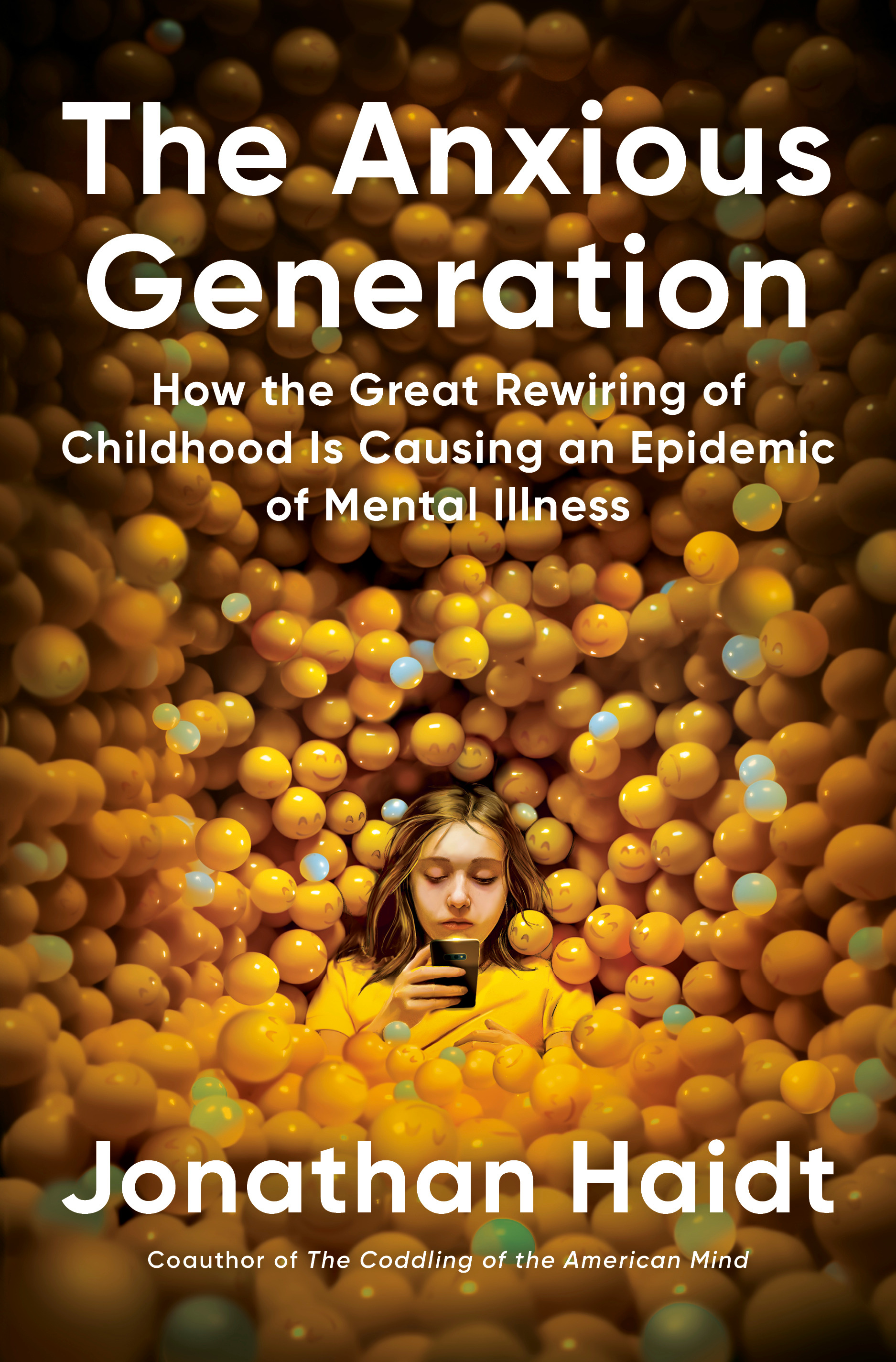
The Anxious Generation: How the Great Rewiring of Childhood Caused an Epidemic of Mental Illness
Jonathan Haidt
About the Author

Jonathan Haidt
Questions & Answers
The shift from a play-based to a phone-based childhood has significantly contributed to the rise in adolescent anxiety and depression through several mechanisms:
- Social Deprivation: The move to online interactions has reduced face-to-face socializing, crucial for developing social skills and emotional regulation.
- Sleep Deprivation: Excessive screen time, especially before bedtime, disrupts sleep patterns, leading to fatigue and mood disorders.
- Attention Fragmentation: Constant notifications and multitasking hinder the ability to focus, affecting cognitive development and emotional stability.
- Addiction: Addictive features of social media and games can lead to compulsive use, further exacerbating mental health issues.
- Spiritual Degradation: The virtual world can detract from experiences that foster spiritual growth and connection, leading to a sense of emptiness and purposelessness.
This transition has disrupted the natural development of children and adolescents, leading to increased vulnerability to anxiety and depression.
The author proposes four foundational reforms to address the mental health crisis among young people and restore a healthier childhood in the digital age:
- No smartphones before high school: Delay children's access to smartphones and internet access until around age 14 to reduce exposure to social comparison and addictive content.
- No social media before 16: Protect the most vulnerable period of brain development by delaying social media access until after adolescence.
- Phone-free schools: Implement policies to keep phones out of schools to enhance in-person interactions and focus on learning.
- More unsupervised play and childhood independence: Encourage free play and independence to foster social skills, reduce anxiety, and develop self-governing adults. These reforms aim to reduce the negative impacts of excessive screen time, promote healthier social interactions, and support holistic child development.
Gender differences, particularly in agency and communion, play a significant role in how social media impacts boys and girls. Boys tend to focus more on agency, seeking to stand out and have an impact on the world, while girls are more focused on communion, desiring connection and belonging. Social media, which often emphasizes visual appearance and social comparison, tends to frustrate communion needs for girls, leading to higher rates of depression and anxiety. For boys, the virtual world can satisfy their agency needs but may lack the social interaction that promotes well-being. This has implications for addressing the mental health crisis, suggesting that interventions should consider gender-specific approaches, such as promoting real-world social connections and risk-taking for boys, and addressing body image and social comparison issues for girls. Additionally, fostering environments that encourage both agency and communion can help mitigate the negative effects of social media on both genders.
The phone-based life can lead to spiritual degradation, affecting both adolescents and adults. This degradation occurs by blocking or counteracting six essential spiritual practices:
- Shared Sacredness: Social media fosters isolation and individualism, reducing the sense of shared purpose and community.
- Embodiment: The virtual world can detach individuals from their physical reality, hindering the development of self-awareness and emotional regulation.
- Stillness, Silence, and Focus: Constant notifications and distractions make it difficult to achieve mental clarity and inner peace.
- Self-Transcendence: The focus on self and material gain can lead to a lack of purpose and meaning in life.
- Being Slow to Anger, Quick to Forgive: Social media's instant feedback loop can encourage anger and judgment, fostering a culture of divisiveness.
- Finding Awe in Nature: The virtual world can detract from experiencing the awe and wonder of the natural world.
These spiritual harms can lead to increased anxiety, depression, and a general sense of disconnection, affecting both mental and emotional well-being.
To reverse the Great Rewiring of Childhood, collective action is crucial. Governments, tech companies, schools, parents, and young people must collaborate:
-
Governments: Enact laws like the Age Appropriate Design Code to protect minors, raise the age of internet adulthood to 16, and revise neglect laws to support childhood independence. They should also fund research on phone-free schools and encourage more play and vocational education.
-
Tech Companies: Implement age verification, limit addictive features, and prioritize children's well-being over profit. They should adopt the Age Appropriate Design Code and develop features that allow parents to control their children's online experiences.
-
Schools: Implement phone-free policies, increase recess and free play, and offer vocational training. Schools should also support boys' engagement by hiring male teachers and offering shop classes.
-
Parents: Delay smartphones and social media access, limit screen time, and model healthy phone habits. They should encourage unsupervised play and support their children's real-world experiences.
-
Young People: Advocate for change, join organizations like Design It For Us, and demand safer online spaces. They should also prioritize real-world connections and experiences.
Together, these actions can restore a healthier play-based childhood and mitigate the negative effects of the Great Rewiring.